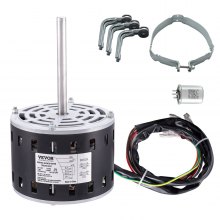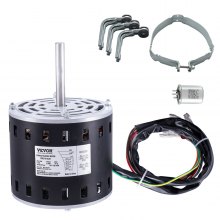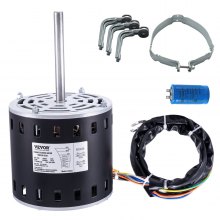VEVOR Explores Noise Reduction Strategies in Modern Furnace Blower Design
In the orchestra of modern living, where comfort meets functionality, the furnace blower is a silent conductor, orchestrating the circulation of warmth throughout our homes.
Yet, as essential as its role may be, the symphony it produces can sometimes discordantly clash with the tranquility we seek. In response to this discord, VEVOR, a pioneering force in industrial and home appliance design, ventures into noise reduction strategies within modern furnace blower design.
Powering our homes, commercial spaces, and other places, the VEVOR’s modern furnace has never disappointed us. As such, we decided to take a closer look at it.
Different Applications Of Furnace Blowers
Furnace blowers are versatile, making them useful in various industries. From residential to commercial buildings, furnace blowers remain part of the operations in many spaces.
Ventilation and Air Conditioning
Blow furnaces also work in ventilation and air conditioning. Besides distributing these fans, they help circulate cool air in hot weather, contributing to indoor air quality and comfort In residential, commercial, or technically, blower furnaces play an important role in proper ventilation and temperature control, improving the well-being of their occupants
Drying and Curing
In manufacturing in various industries, blast furnaces are used in drying and curing processes. Whether in textiles, paints, food, or manufacturing, controlled airflow is essential to speed drying time and ensure even curing.
Blow ovens facilitate this process by providing hot air circulation, removal of water, and rapidly drying or fading materials, thereby increasing operational efficiency and productivity
Waste Management and Pollution Control
play an important role in waste management and pollution control programs. In combustion plants and waste-energy plants, blowers assist the combustion process by providing air for combustion and facilitating the removal of combustion products there
Factors To Consider When Buying Furnace Blowers
Buying a furnace blower is beyond going to the market to pick one up. There are many things to consider to make a suitable choice to give you value for your money.
Apart from checking the suitability of your furnace and other basics, here are other considerations to make.
Airflow Capacity
Determine the blower’s airflow capacity, usually measured in cubic feet per minute (CFM). The CFM level should match the heat and ventilation needs of your space, ensuring adequate circulation of hot air without overworking the system.
Variable Speed Options
Choosing a variable-speed blower allows you to control airflow and temperature better. This flexibility enables customized operation based on specific heat requirements and can contribute to energy savings.
Noise Level
Consider the amount of noise the lawn produces, especially if it is to be installed in residential or noisy areas. Choose models with sound-absorbing or low-noise features to minimize disturbances to occupants.
Installation Requirements
Consider the blower’s installation requirements, including space ease, mounting options, and compatibility with existing ductwork. Make sure the installation is doable and easy, whether it’s a DIY job or with the help of professionals.
Signs You Might Need a Furnace Blower Replacement
Knowing when to replace a furnace blower will save you much stress and enable your furnace to function at its best capacity. However, not everyone is a professional mechanic who can diagnose thoroughly. Instead, you should know what signs to look out for.
Unusual Noises
Excessive or unusual noises from the furnace blower, such as rattling, grinding, or screeching, may indicate a mechanical problem or component wear. These noises may indicate that the blower motor or bearings are deteriorating and should be replaced to avoid additional damage.
Weak Airflow
If you observe a reduced airflow from your vents, it might indicate a faulty blower. Various factors, including a worn-out blower motor, broken fan blades, or clogged air filters, can cause reduced airflow. An expert check can help decide whether the blower requires replacement.
Inconsistent Heating
Uneven temperatures throughout your home or apartment, with some rooms feeling hotter or cooler than others, can indicate that the air conditioning isn’t working properly. Inefficient air conditioning can disrupt hot air distribution, resulting in uneven heating and reduced comfort levels.
Failure to Start
If your furnace fails to start or frequently cycles, it could be due to a faulty blower motor or control panel. A thorough inspection can help identify an underlying issue and determine if the pallet needs to be replaced.
Why Choose VEVOR Furnace Blowers?
Navigating the rugged terrain created in a blow furnace, VEVOR meets a delicate balance of performance and composure. VEVOR’s insights into noise reduction strategies stand out as evidence of innovation and adaptability.
Behind the technological innovation, however, lies a deeper ethos that guides VEVOR’s efforts. Central to its mission is the promise to improve the lives of individuals worldwide. Recognizing the significant impact of noise on well-being, VEVOR seeks not only to reduce its impact but also to create an environment of peace.
VEVOR’s furnace blasters prioritize energy efficiency, helping to reduce material costs and reduce environmental impact. Thanks to features such as variable speed settings and better airflow efficiencies, these fans maximize heat distribution while minimizing energy consumption, resulting in significant long-term savings.
FAQs About Furnace Blower
How often should I replace my furnace blower filter?
Furnace blowers generally need to be replaced every 1 to 3 months, depending on factors such as the type of filter used, the air quality used in the room, the frequency of oven use, etc., and also reduce efficiency.
How can I improve the efficiency of my furnace blower?
You can by ensuring proper maintenance, such as changing filters regularly, cleaning ductwork, and scheduling professional inspections. Additionally, upgrading to a variable-speed blower can improve energy efficiency and comfort management.
What should I do if my furnace blower is making unusual noises?
If your furnace blower makes an unusual noise, such as clicking, grinding, or banging, it’s important to address the problem immediately. Turn off the furnace and consult a qualified HVAC technician to diagnose the problem and determine the appropriate course of action, including repair or replacement.


























































































